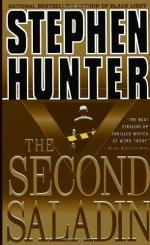|
This section contains 4,885 words (approx. 17 pages at 300 words per page) |

|
SOURCE: “Conclusion” in Saladin: Politics of the Holy War, Cambridge University Press, 1982, pp. 365–85, 432–37.
In the following essay, Lyons and Jackson offer a brief assessment of Saladin's reputation, commenting that Saladin's Muslim contemporaries alternately viewed him as a hero of Islam or as a manipulator who used Islam to achieve personal power. Lyons and Jackson provide evidence of Saladin's strengths and weaknesses.
To his admirers, Saladin on his death-bed at Damascus can be seen as the hero of Islam, the destroyer of the Latin Kingdom and the restorer of the shrines in Jerusalem. Eulogy, however, must accommodate itself to the fact that such a view was not accepted by numbers of his Muslim contemporaries. He can be pictured by his detractors as manipulating Islam to win power for himself and his family and only then launching on an adventure which still left a Frankish state poised to strike, if...
|
This section contains 4,885 words (approx. 17 pages at 300 words per page) |

|


